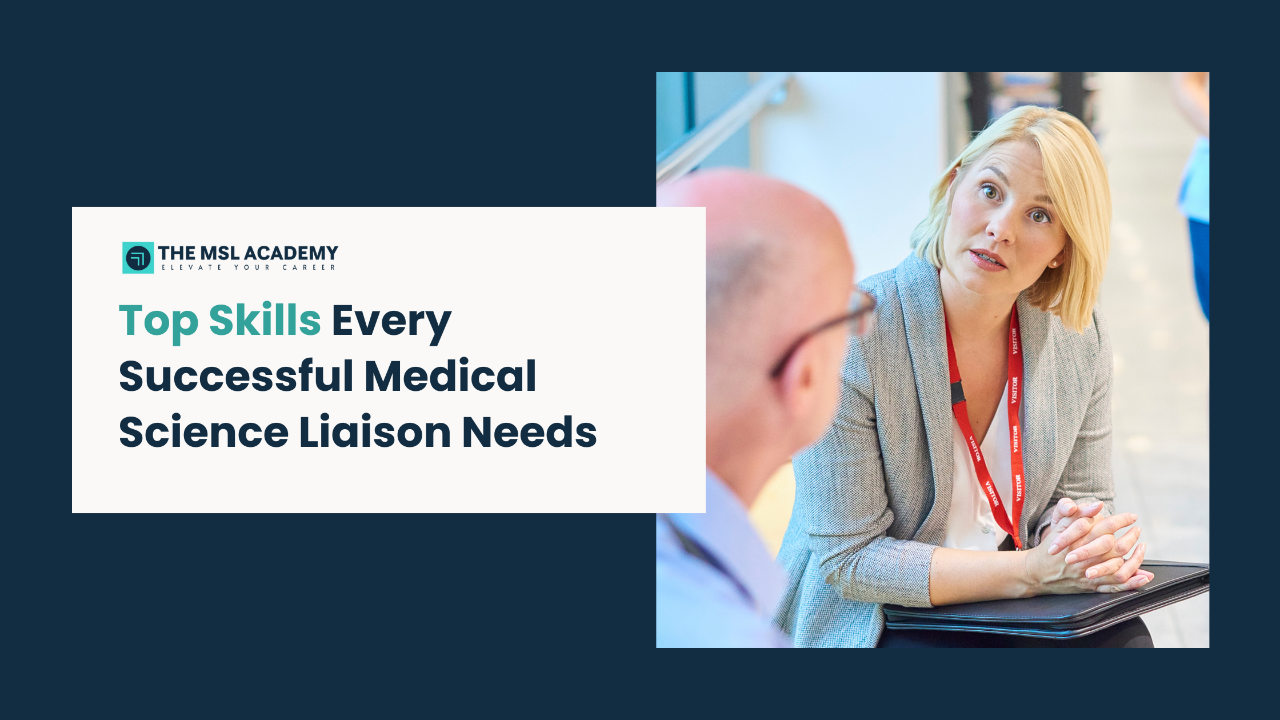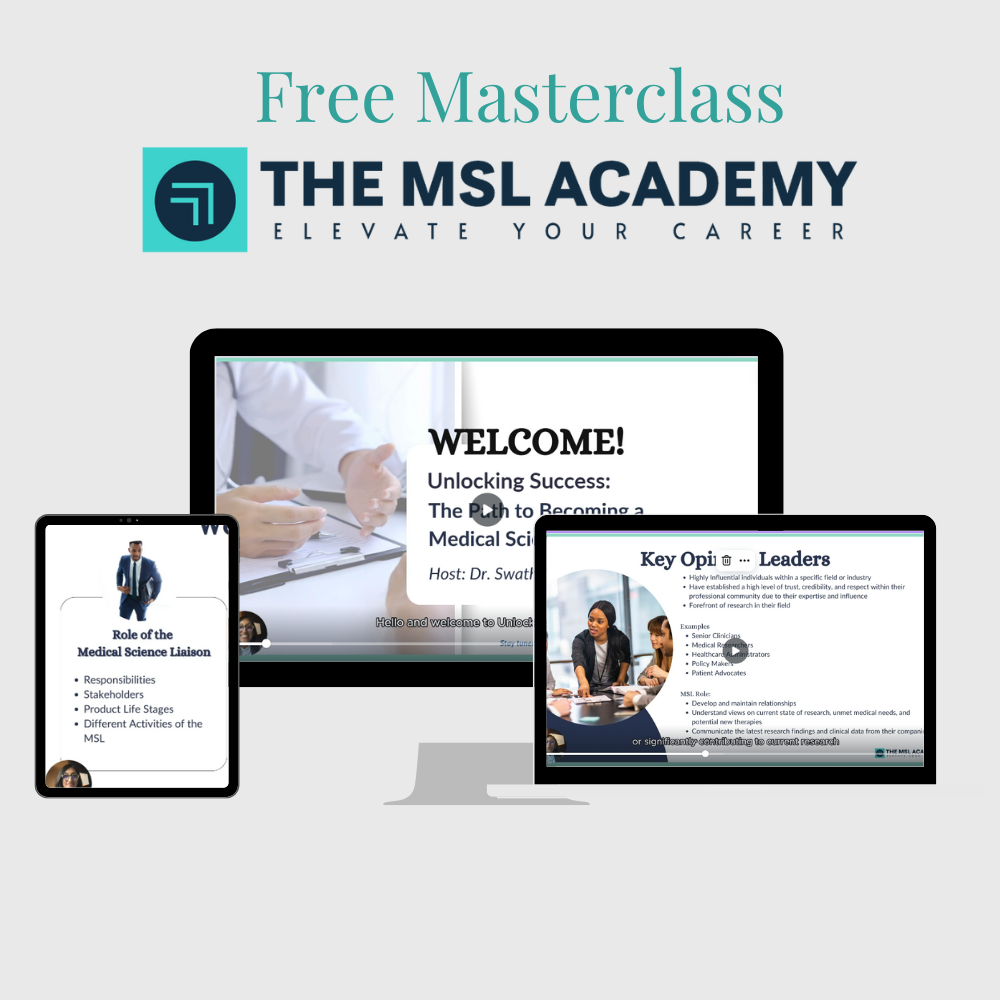Top Skills Every Successful Medical Science Liaison Needs
Jul 04, 2025
The Medical Science Liaison (MSL) role is one of the most rewarding–and competitive–career paths in the pharmaceutical, biotechnology, and medical device industries. As field-based scientific experts, MSLs serve as a critical bridge between companies and the healthcare community.
But, what exactly separates a good MSL from a great one?
Whether you are an aspiring MSL or looking to sharpen your edge in the field, this post breaks down the top MSL skills and competencies that hiring managers look for–and that high-performing MSLs rely on every day.
Let’s dive into the must-have skillset, explore real-world examples, and give you clear, actionable tips to help you become a standout candidate (or professional) in the MSL world.
What Makes the MSL Role Unique?
The MSL role blends science, communication, and strategy in a way few jobs do. You need to:
- Understand complex clinical data
- Educate and influence healthcare providers (HCPs)
- Operate independently in the field
- Collaborate cross-functionally with internal teams
- Remain compliant within strict regulatory guidelines
This combination means MSLs must be exceptionally versatile. They’re not just scientists. They’re also educators, relationship builders, strategic thinkers, and trusted field ambassadors.
1. Scientific Expertise & Clinical Acumen

Why It Matters:
MSLs are expected to be subject matter experts (SMEs) in the therapeutic area they support. Whether you’re discussing clinical endpoints, mechanisms of action, or comparative studies, you must be able to interpret, synthesize, and communicate complex data with ease.
Examples of Scientific Competencies:
- Interpreting peer-reviewed publications
- Understanding clinical trial protocols and endpoints
- Speaking confidently about MOA, efficacy, safety, and limitations
- Anticipating scientific objections and addressing them with evidence
How to Build This Skill:
- Stay current with PubMed, NEJM, and key specialty journals in your field
- Subscribe to medical affairs newsletters and industry updates
- Consider a therapeutic area-specific certification or course to strengthen your expertise
2. Communication & Scientific Storytelling
Why It Matters:
Being scientifically brilliant is not enough–you must be able to translate complex data into meaningful insights for your audience. Whether you're engaging with a top KOL or presenting internally, communication is key.
Essential Communication Channels:
- 1:1 scientific exchange with KOLs
- Presenting at advisory boards or roundtables
- Writing post-meeting summaries or field insights
- Participating in cross-functional meetings
How to Be a Strong Scientific Communicator:
- Use clear, confident language–tailor it based on your audience (MD, RN, PharmD, etc.)
- Practice storytelling: use clinical trial data to tell a cohesive scientific narrative
- Seek feedback on your presentation skills, especially during mock interviews or internal dry runs
3. Emotional Intelligence (EQ)
Why It Matters:
The best MSLs are empathetic, self-aware, and relational. You’ll work with people who are skeptical, busy, or under pressure—being emotionally intelligent helps you build trust and rapport.
Core EQ Attributes:
- Active listening
- Adaptability in tone and approach
- Reading non-verbal cues
- Managing conflict or resistance diplomatically
How to Strengthen Your EQ:
- Practice reflection after each KOL interaction—what went well? What could improve?
- Use tools like 360 feedback or EQ assessments to pinpoint areas for growth
- Attend workshops or coaching sessions focused on relationship management
4. Strategic Thinking
Why It Matters:
MSLs do not just deliver information–they gather insights, identify trends, and help shape medical strategy. Understanding how your field activities tie into broader business goals is essential.
Examples of Strategic MSL Thinking:
- Identifying unmet needs in a disease area through KOL discussions
- Flagging patterns in off-label inquiries to inform evidence generation
- Understanding how competitor data may affect therapeutic positioning
Ways to Think More Strategically:
- Ask yourself: “What does this insight mean for the brand or pipeline?”
- Regularly debrief with your Medical Directors or MSL Managers
- Keep up with market intelligence and pipeline competitors
5. Field Autonomy & Self-Management
Why It Matters:
Unlike office-based roles, MSLs are often remote and field-based, managing their own time, territory, and goals. You’ll need strong discipline to succeed without direct oversight.
Key Self-Management Skills:
- Calendar and territory planning
- Prioritizing high-value KOLs or institutions
- Logging activities and insights in CRM systems (like Veeva)
How to Develop Autonomy:
- Use project management tools like Trello or Asana for task tracking
- Plan your week with a balance of KOL meetings, admin time, and internal collaboration
- Always follow through because your reliability builds internal trust
6. Cross-Functional Collaboration
Why It Matters:
MSLs regularly collaborate with teams across the organization:
- Medical Affairs: to align on scientific strategy and insights with internal team
- Clinical Operations: to support clinical trial site selection or protocol feedback
- Regulatory/Legal: to ensure compliant communications
- Commercial Teams: to maintain field alignment (non-promotional)
How to Strengthen Collaboration:
- Learn the lingo of other departments—understand how they define success
- Attend cross-functional training or brand planning meetings when possible
- Be the bridge that helps departments stay aligned without crossing compliance lines
7. Compliance & Ethical Integrity
Why It Matters:
The MSL role operates within tight legal and regulatory boundaries. Your credibility–and the company’s reputation–depends on maintaining compliance at all times.
Compliance Topics MSLs Must Know:
- On-label vs. off-label communication
- PhRMA Code and FDA regulations
- Fair balance and scientific exchange
- IIT processes and approval chains
Ways to Stay Compliant:
- Attend all required training—and ask questions if anything is unclear
- When in doubt, escalate to Medical Affairs or Legal
- Document everything properly in your CRM or medical information system
8. Technology Fluency
Why It Matters:
As a field-based professional, you’ll rely on tools and platforms to manage your territory, log interactions, and stay informed.
Common MSL Tools:
- Veeva CRM or Salesforce for tracking KOL engagements
- Zoom/Teams for virtual meetings
- PubMed, ClinicalTrials.gov, and internal portals for literature
- Data visualization tools like PowerPoint, Tableau, or Excel for presentations
How to Stay Up-to-Date:
- Ask your employer or manager for tool-specific training
- Take online courses to learn tools like PowerPoint storytelling or CRM data entry
- Regularly review platform updates and new features
9. Adaptability in a Changing Industry
Why It Matters:
The life sciences industry is constantly evolving–new therapies, regulatory shifts, and digital innovations are emerging every day. MSLs must remain flexible, curious, and proactive to thrive.
Key Areas Where Adaptability Matters:
- Shifting from in-person to virtual KOL meetings (especially post-COVID)
- Adjusting scientific messaging in response to new trial data
- Pivoting territories, roles, or therapeutic areas as needed
How to Build Adaptability:
- Say “yes” to new challenges, projects, or initiatives
- Stay curious–read about new trends in med affairs, AI, and clinical operations
- Embrace feedback and use it as fuel for growth
10. Resilience & Growth Mindset
Why It Matters:
The MSL role can be high-pressure–territory changes, tough KOL conversations, internal re-orgs. A growth mindset helps you bounce back and continue delivering value.
How to Cultivate Resilience:
- View challenges as learning opportunities
- Join peer communities like The MSL Academy’s network
- Reflect on wins and setbacks regularly, and adjust your approach accordingly
Summary: Core MSL Skills You Need to Succeed

|
Skill |
Why It Matters |
|
Scientific Expertise |
Builds credibility with KOLs |
|
Communication |
Ensures effective knowledge transfer |
|
Emotional Intelligence |
Strengthens relationships |
|
Strategic Thinking |
Aligns field insights with business goals |
|
Autonomy |
Drives self-managed productivity |
|
Collaboration |
Keeps you aligned with cross-functional teams |
|
Compliance Knowledge |
Protects company and patient safety |
|
Tech Fluency |
Powers your field efficiency |
|
Adaptability |
Helps you thrive in change |
|
Resilience |
Keeps you growing, even under pressure |
Final Thoughts: How to Be a Great MSL
There’s no single path to becoming a great MSL, but mastering these skills is the foundation.
Whether you’re applying for your first MSL role or looking to upskill, focus on building a balanced mix of scientific acumen, strategic thinking, and human connection. That’s what separates a technical expert from a true medical affairs leader.
Not an MSL Yet? Want to Become an MSL?
If you are serious about becoming a Medical Science Liaison, The MSL Academy™ is here to support you every step of the way.
Explore our Excel Into MSL Platinum Program, which includes:
- Cover letter, resume & LinkedIn profile optimization
- 1:1 coaching for mock interviews & scientific presentation prep
- Access to coaches who work full-time as an MSL and mentor clients in the program
- Board certification as a Medical Science Liaison to stand out in applications
- Direct feedback from industry MSLs and hiring managers
You’ll gain the tools, training, and confidence to position yourself as the next great MSL hire.



